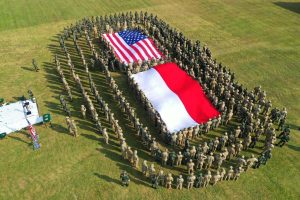Japanese defense forces will participate for the first time in Indonesia’s Garuda Shield military exercises next month, Japanese Prime Minister Kishida Fumio announced today, following talks with Indonesian President Joko “Jokowi” Widodo.
According to Reuters, Kishida confirmed that Japan’s Self-Defence Forces would take part in the annual exercises, which will be held in Indonesia from August 1 to 14, with an expanded slate of participating countries. The two nations also agreed to cooperate more closely on energy, with Kishida saying Indonesia was a “key strategic partner for Japan.”
Kishida’s announcement of Japan’s involvement followed a statement from the U.S. Indo-Pacific Command (INDOPACOM) that mentioned Japan’s inaugural participation in the exercises. This year’s iteration of the exercises will be “significantly larger in scope and scale than previous exercises,” the statement added, and Japan will not be the only nation participating or observing for the first time. Australia and Singapore will also take part in the exercises, while eight other countries, including France, India, and Malaysia, will join as “observer nations.”
According to the statement, Garuda Shield, which has been held between the Indonesian National Armed Forces and INDOPACOM since 2009, is “designed to strengthen interoperability, capabilities, trust, and cooperation built over decades of shared experiences.”
The involvement of Japanese defense forces in the exercises marks a milestone in the evolving defense relationship between Japan and Indonesia. Meeting with Jokowi in Tokyo today, Kishida said that Japan hoped to work with Indonesia to realize a “free and open Indo-Pacific region,” code for joint efforts to counter Beijing’s rising power and influence, the Japan Times reported.
The summit between Jokowi and Kishida was the second between the two leaders following a meeting in Jakarta in late April, during which they pledged to “further strengthen the strategic partnership between the two countries.”
There is a lot pushing the two nations into closer alignment, beginning with their maritime orientation and common anxiety about the destabilizing impacts of China’s growing maritime clout and assertiveness in the East and South China seas. While Indonesia does not describe itself as a formal claimant to the South China Sea, recent years have seen periodic tensions in the waters around the Natuna Islands, which are bisected by Beijing’s “nine-dash line” maritime claim. Indeed, this anxiety about Chinese capabilities and intensions is shared to various extents in the region at large, which explains the growing roster of nations participating in the Garuda Shield exercises.
This further strengthening of the strategic partnership between Tokyo and Jakarta comes a day after the Indonesian president stopped in China for talks with President Xi Jinping and Premier Li Keqiang, part of a three-nation tour of East Asia. During the talks, the two sides pledged to scale up their already flourishing trade relationship and expand cooperation in areas such as agriculture and food security.
A statement from Jokowi’s office cited by the Associated Press said he described China as Indonesia’s “comprehensive strategic partner.” “We must fill this partnership with cooperation that is beneficial for our country, and at the same time for the region and the world,” the statement quoted Widodo as saying.
Building economic ties with China, in order to underwrite his domestic political agenda, while establishing a web of security partnerships designed to hold the line against maritime incursions by Chinese fishing boats and maritime militia vessels: one could hardly ask for a more handy demonstration of Jokowi’s foreign policy of “pragmatic equidistance.”

































